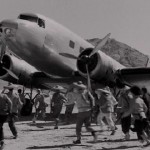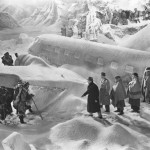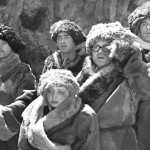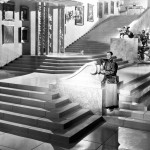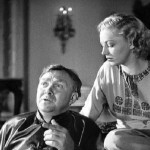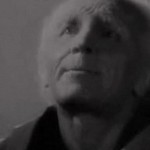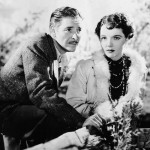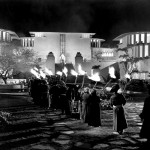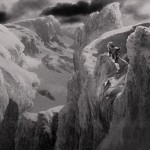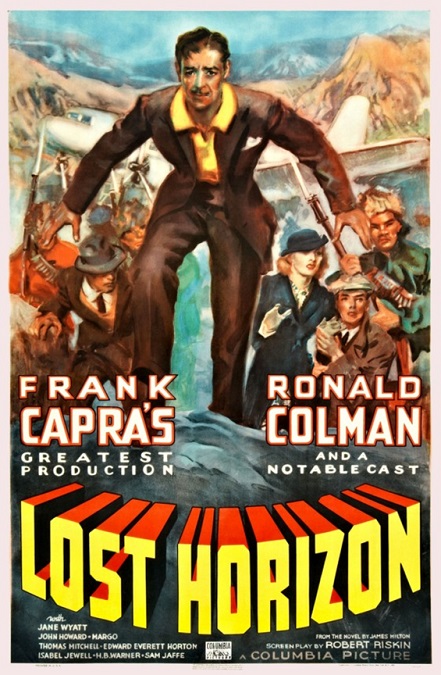
Lost Horizon – 1937
This was a very ambitious movie for a number of reasons. I liked it even though large portions of it were pretty schmaltzy. It is the first Best Picture Nominee I have come across that I could categorize as a Science Fiction or Fantasy movie. It definitely had a supernatural quality about it.
It was about a group of people who are fleeing the war-torn country of China, specifically, the city of Baskul. However, my research tells me that Baskul is actually a city in modern-day Iran, not China. But never-mind that. As Robert Conway, played by Ronald Coleman, his brother George, played by John Howard, Alexander Lovett, played by Edward Everett Horton, Henry Barnard, played by Thomas Mitchell and Gloria Stone, played by Isabell Jewell fly away from the oncoming revolutionary army, they think their troubles are over. But unbeknownst to them, their airplane has been hijacked by a mysterious man.
He keeps them in the air for days, flying over mountain ranges. When the plane runs out of fuel, it crashes high in the Himalayas. With the pilot dead, the terrified passengers brace themselves for death. But as luck would have it, they are found by a group of men and taken to a hidden city in the mountains. Despite the bitter freezing cold of the mountain range, the city lies in a valley of sunshine and eternal spring.
And there begins the main body of the film. It is the legendary city of Shangri-La. The mythical city is, of course not real. It is a city known for its perfect peace, its utopian society, its air of calm tranquility. According to the film, it offered nearly eternal youth and vitality. Never-mind that it had plenty of aged inhabitants.
But what the film did so well, was that it kept secret whether the magic of Shangri-La was real or not. At the end, George convinces his brother that it is a lie. As a viewer, even I was convinced that it was a dream that couldn’t be real. The brothers leave and it isn’t until it is too late that they find that it was all quite true.
The film didn’t have any big special effects, no mind bending imagery. But the narrative was very well constructed, allowing the imagination of the view to fill in the blanks. Also, the great score by composer Dimitri Tiomkin was ethereal and other-worldly. The movie was filmed in black and white, though it was originally intended to be filmed in color. However, the use of black and white stock footage in scenes involving the Himalayas prevented director Frank Capra from doing this.
Now, here is something interesting about the film. Before the movie began, a message came on the screen to inform the viewer that no copy of the complete film exists. However, a complete copy of the sound-track was found. When the film was restored by the UCLA Film and Television Archive in 1973, the closest they could get to Capra’s original film was to show still shots of the speaking characters as their dialogue played out whenever the film footage was not available.
And that is just what happened. For a cumulative total of over 7 minutes, still shots and production photos of the actors in costume were displayed on the screen as their voice tracks continued playing. It was very cleverly done and greatly appreciated to have the complete narrative of the original script to remain intact.
Other notable actors in the movie were Jane Wyatt as Sondra Bizet, Ronald’s love interest in Shangri-La, H.B. Warner as Chang, their mysterious host and Sam Jaffe as the High Lama, leader of the mythical city.
It was actually very refreshing to see a movie in the list of Best Picture Nominees that was a true science-fiction film. It was thought provoking and insightful. However, the fact that it’s main message was of peace, contentment, kindness and brotherhood was not lost on me. The film came out in a time when WWII was looming on the horizon. I am not surprised that a movie with such an enlightened point of view was so popular.
Also, I have to add that the opening sequence on the airfield and the scenes that took place in the cold mountains of the Himalayas were particularly well done. Chaotic scenes like that must have been a real challenge for the director. Well done, Capra! Incidentally, a musical remake was done in 1973. It flopped horribly.
